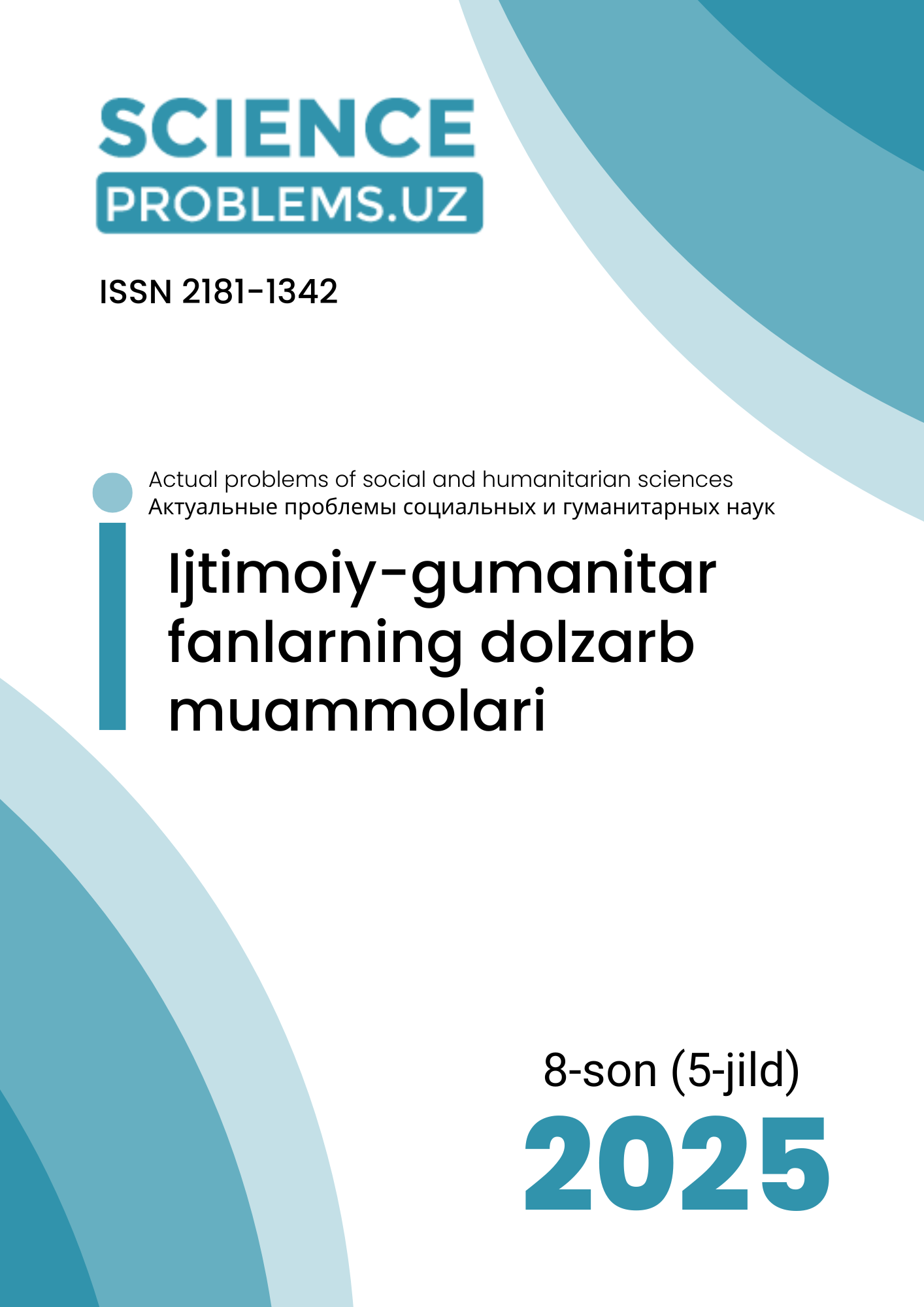ALGORITHMIC ACCOUNTABILITY IN THE FIELD OF ARTIFICIAL INTELLIGENCE: SOCIAL, LEGAL, AND ORGANIZATIONAL APPROACHES
DOI:
https://doi.org/10.47390/SPR1342V5I8Y2025N37Keywords:
artificial intelligence, algorithmic accountability, social accountability, users, algorithmic audit, regulators, transparency, technological ethics, information security, algorithm designAbstract
This article analyzes the impact of artificial intelligence systems on social life and the issue of ensuring accountability in their operation from social, legal, and organizational perspectives. It explores mechanisms for effectively managing algorithmic accountability, the role of stakeholders, and the criteria for determining responsibility.
References
1. Obermeyer Z, Powers B, Vogeli C, Mullainathan S (2019) Dissecting racial bias in an algorithm used to manage the health of populations. Sci 366(6464):447–453. https://doi.org/10.1126/ science.aax2342
2. Blattner L, Nelson S (2021) How costly is noise? Data and disparities in consumer credit. https://doi.org/10.48550/ARXIV.2105.07554
3. Mattu S, Hill K (2022) How a company youʼve never heard of sends you letters about your medical condition*. In: Martin K (ed) Ethics of data and analytics. Auerbach, pp 107–111. https://doi. org/10.1201/9781003278290-17
4. Liu B, Ding M, Shaham S, Rahayu W, Farokhi F, Lin Z (2022) When machine learning meets privacy: a survey and outlook. ACM Comput Surv 54(2):1–36. https://doi.org/10.1145/3436755
5. Novelli C, Taddeo M, Floridi L (2023) Accountability in artificial intelligence: what it is and how it works. AI Soc. https://doi.org/ 10.1007/s00146-023-01635-y
6. Wieringa M (2020) What to account for when accounting for algorithms: a systematic literature review on algorithmic accountability. In: Proceedings of the conference on fairness, accountability, and transparency. https://doi.org/10.1145/ 3351095.3372833
7. Donia J (2022) Normative logics of algorithmic accountability. In: ACM conference on fairness, accountability, and transparency, pp 598–598. https://doi.org/10.1145/3531146.3533123
8. Jobin A, Ienca M, Vayena E (2019) The global landscape of AI ethics guidelines. Nat Mach Intell 1(9):389–399. https://doi.org/10. 1038/s42256-019-0088-2
9. Poechhacker, Nikolaus & Kacianka, Severin. (2021). Algorithmic Accountability in Context. Socio-Technical Perspectives on Structural Causal Models. Frontiers in Big Data. 3. 10.3389/fdata.2020.519957.
10. Bovens M (2007) Analysing and assessing accountability: a concep tual framework. Eur Law J 13(4):447–468. https://doi.org/10. 1111/j.1468-0386.2007.00378.x
11. Wieringa, Maranke. (2020). What to account for when accounting for algorithms: a systematic literature review on algorithmic accountability. 1-18. 10.1145/3351095.3372833.
12. Feuerriegel S, Dolata M, Schwabe G (2020) Fair AI: challenges and opportunities. Bus Inf Syst Eng 62(4):379–384. https://doi.org/ 10.1007/s12599-020-00650-3
13. Lipton ZC (2018) The mythos of model interpretability. Commun ACM 61(10):36–43. https://doi.org/10.1145/3233231
14. Liu B, Ding M, Shaham S, Rahayu W, Farokhi F, Lin Z (2022) When machine learning meets privacy: a survey and outlook. ACM Comput Surv 54(2):1–36. https://doi.org/10.1145/3436755
15. Tocchetti A, Corti L, Balayn A, Yurrita M, Lippmann P, Brambilla M, Yang J (2022) A.I. robustness: a human-centered perspective on technological challenges and opportunities. https://doi.org/10. 48550/ARXIV.2210.08906
16. Bryson JJ, Diamantis ME, Grant TD (2017) Of, for, and by the people: the legal lacuna of synthetic persons. Artif Intell Law 25(3):273–291. https://doi.org/10.1007/s10506-017-9214-9
17. Martin K (2022) Algorithmic bias and corporate responsibility: how companies hide behind the false veil of the technological imperative*. In: Martin K (ed) Ethics of data and analytics. Auerbach, pp. 36–50. https://doi.org/10.1201/9781003278290-7
18. Schneider, Johannes & Abraham, Rene & Meske, Christian & Brocke, Jan vom. (2022). Artificial Intelligence Governance For Businesses. Information Systems Management. 40. 10.1080/10580530.2022.2085825.
19. Mueller B (2022) Corporate digital responsibility. Bus Inf Syst Eng 64(5):689–700. https://doi.org/10.1007/s12599-022-00760-0
20. Shin D, Park YJ (2019) Role of fairness, accountability, and transparency in algorithmic affordance. Comput Hum Behav 98:277–284. https://doi.org/10.1016/j.chb.2019.04.019
21. Buhmann A, Paßmann J, Fieseler C (2020) Managing algorithmic accountability: balancing reputational concerns, engagement strategies, and the potential of rational discourse. J Bus Ethics 163(2):265–280. https://doi.org/10.1007/s10551-019-04226-4
22. Kellogg KC, Valentine MA, Christin A (2020) Algorithms at work: the new contested terrain of control. Acad Manag Ann 14(1):366–410. https://doi.org/10.5465/annals.2018.0174
23. Greʼgoire Y, Fisher RJ (2008) Customer betrayal and retaliation: when your best customers become your worst enemies. J Acad Mark Sci 36(2):247–261. https://doi.org/10.1007/s11747-007-0054-0
24. Benson A, Sojourner A, Umyarov A (2020) Can reputation discipline the gig economy? Experimental evidence from an online labor market. Manag Sci 66(5):1802–1825. https://doi.org/10.1287/ mnsc.2019.3303
25. Slota SC, Fleischmann KR, Greenberg S, Verma N, Cummings B, Li L, Shenefiel C (2021) Many hands make many fingers to point: challenges in creating accountable AI. AI Soc. https://doi.org/10. 1007/s00146-021-01302-0
26. Stahl BC (2021) Addressing ethical issues in AI. In: Stahl BC (ed) Artificial intelligence for a better future. Springer, pp 55–79. https://doi.org/10.1007/978-3-030-69978-9_5
27. Mattu S, Hill K (2022) How a company youʼve never heard of sends you letters about your medical condition*. In: Martin K (ed) Ethics of data and analytics. Auerbach, pp 107–111. https://doi. org/10.1201/9781003278290-17
28. Raji ID, Xu P, Honigsberg C, Ho D (2022) Outsider oversight: designing a third party audit ecosystem for AI governance. In: Proceedings of the 2022 AAAI/ACM conference on AI, ethics, and society, pp 557–571. https://doi.org/10.1145/3514094. 3534181
29. Metcalf J, Moss E, Watkins EA, Singh R, Elish MC (2021) Algorithmic impact assessments and accountability: the co construction of impacts. In: Proceedings of the 2021 ACM conference on fairness, accountability, and transparency, pp 735–746. https://doi.org/10.1145/3442188.3445935
30. Martin K, Waldman A (2022) Are algorithmic decisions legitimate? The effect of process and outcomes on perceptions of legitimacy of AI decisions. J Bus Ethics. https://doi.org/10.1007/s10551 021-05032-7
31. Ma¨ntyma¨ki M, Minkkinen M, Birkstedt T, Viljanen M (2022) Defining organizational AI governance. AI Ethics. https://doi. org/10.1007/s43681-022-00143-x
32. Feuerriegel S, Dolata M, Schwabe G (2020) Fair AI: challenges and opportunities. Bus Inf Syst Eng 62(4):379–384. https://doi.org/ 10.1007/s12599-020-00650-3
33. Jobin A, Ienca M, Vayena E (2019) The global landscape of AI ethics guidelines. Nat Mach Intell 1(9):389–399. https://doi.org/10. 1038/s42256-019-0088-2
34. Schneider J, Abraham R, Meske C, Vom Brocke J (2022) Artificial intelligence governance for businesses. Inf Syst Manag. https:// doi.org/10.1080/10580530.2022.2085825








